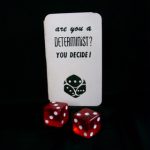 The paper of the day: “The Value of Believing in Free Will.” A scientific study that shows why many scientists and philosophers are reluctant to tell people they don’t have free will.
The paper of the day: “The Value of Believing in Free Will.” A scientific study that shows why many scientists and philosophers are reluctant to tell people they don’t have free will.
This is from the commonsenseatheism site, which many readers of this blog will already have seen, but for the others, it’s interesting reading. I think I can relate to its conclusions.
For those who don’t want to read the whole thing or want to test the water, some extracts:
The belief that one determines one’s own outcomes is strong and pervasive. In a massive survey of people in 36 countries, more than 70% agreed with the statement that their fate is in their own hands (International Social Survey Programme, 1998).
Yet the view from the scientific community is that behavior is caused by genes underlying personality dispositions, brain mechanisms, or features of the environment (e.g., Bargh, in press; Crick, 1994; Pinker, 2002). There is reason to think that scientists’ sentiment is spreading to nonscientists. For example, the news magazine The Economist recently ran the headline, ‘‘Free to Choose? Modern Neuroscience Is Eroding the Idea of Free Will’’ (‘‘Free to Choose?’’ 2006). What would happen if people came to believe that their behavior is the inexorable product of a causal chain set into motion without their own volition? Would people carry on, selves and behavior unperturbed, or, as Sartre suggested, might the adoption of a deterministic worldview serve as an excuse for untoward behaviors?
That’s the opener. The conclusion . . . . Continue reading “Free Will and the Value of Self-Deception”
